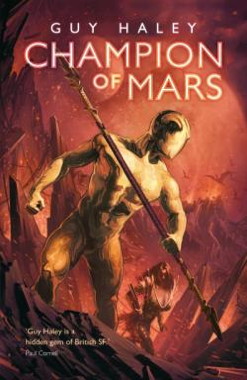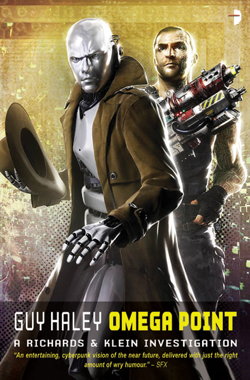Champion Of Mars: author Guy Haley interview
With two more SF books out this year, we quiz the erstwhile SFX staffer about worldbuilding, getting published and the greats of SF fiction
With two more SF books out this year, we quiz the erstwhile SFX staffer about worldbuilding, getting published and the greats of SF fiction
Writing in the tradition of Ray Bradbury, Edgar Rice Burroughs and Michael Moorcock, SFX 's own Guy Haley's latest book is Champion Of Mars ( published by Solaris ). We took this opportunity to ask this new voice in science fiction about Mars, Warhammer, the influences on his work and his plans for the future:
SFX: Tell us about your latest book. What happens?
Haley: It's divided into three strands; a near-future story, where a group of scientists are cataloguing a remnant Martian ecosystem before it's swept away by terraforming; a far future part where Mars' greatest warrior must try and prevent the final extinction of mankind; and a series of short episodes that bridge the aeons in between. I suppose it's about the cyclical nature and indomitably of life, the mutability (or immutability) of personality, and the main component of it is a love story that spans millennia. There are also spaceships, sieges, swordplay, monsters and robots. Something for everyone!

SFX: Is it written consciously in the planetary romance tradition? Did you set out to homage the tropes of the "Of Mars" genre or subvert them?
Haley: Do you know, although I've read a fair number of Burroughs' stories, I've never read John Carter in the original. I've been exposed to him through geek culture, pastiches, and homage however, as well as through comic book adaptations and the like, Michael Moorcock's Warrior Of Mars being a key one.
The inspiration for Champion Of Mars comes equally from the planetary romance and dying earth subgenres. I love stories of exotic, worn-out worlds where near-magical technology and old-school heroics rub shoulders, where you have fantastic palaces and monsters and swordplay sitting comfortably with spaceships and machine intelligence. Whether it's Earth or elsewhere doesn't really matter. William Hope Hodgson's The Night Land , Gene Wolfe's The Book Of The New Sun , Moorcock's Dancers At The End Of Time , HG Wells' The Time Machine , M John Harrison's Viriconium , Clarke Ashton Smith's short stories – all of those things and more were influences, along with Flash Gordon and Buck Rogers and the like.
Ray Bradbury's Martian Chronicles were a very important influence – the structure of the book owes a lot to Bradbury's novel, which is made up of several short stories. Also, I wanted to get that sense of deep time, and melancholy at the passing of material things. Nobody does that better than Bradbury.
Initially the book came about because I've always found the idea of Mars housing this ancient, decrepit civilisation fascinating. That idea, and therefore a large amount of early 20th century SF, was born from two things: an early theory on planetary formation that speculated that the solar system's worlds were formed in order from the outside in. Ergo, Mars was older than Earth, and so its civilisation must be older than ours. Secondly, in 1877 the astronomer Giovanni Schiaperelli thought he could see seas and channels on the surface of Mars, and the press seized on these as being "canals", built by a dying race trying to water their arid world.
Sign up to the SFX Newsletter
Get sneak previews, exclusive competitions and details of special events each month!
Obviously, we know now that neither of these things are true, so I was wondering, how could I create a civilisation like that described by Burroughs et al in a way commensurate with modern science, hence the far future parts. Short answer: it's definitely an homage. If it's subversive at all, it's in my marrying of hero-culture exoticism with hard science, near-future SF. That was a key aim of the novel, to show something almost familiar and scientifically plausible in the near future changing over thousands of years into something alien and mystifying, and in doing so bringing together all the magnificent visions of Mars we've seen over the last century in one place.
SFX: How do you go about world building a Mars that is both familiar to SF fans yet fresh? Can you appeal to fans of classic SF without being too derivative?
Haley: I think where Champion Of Mars will appeal is in that bridging of the gap between pulp and hard SF. I had a lot of fun writing it, and although bringing the two together might seem to some people like an odd joining, I've had some very enthusiastic feedback. I want the readers to get sucked into this sense of time, something Olaf Stapledon did so well in Last And First Men , to show that what we are culturally programmed as permanent is anything but. And I suppose a big point of the novel is to say that only human nature is eternal; little else is.
The hard SF stuff I have tried as best I can to make it all up to date with current thinking. The short, bridging stories I've tried to make as engaging as possible (and I enjoyed writing these the most). People have been writing about Mars forever, so it would be hard to generate something entirely original, but I hope in my synthesis of all these elements, I have managed to create a fresh way of looking at them.
SFX: Were you a fan of the Edgar Rice Burroughs stories? What did you make of the recent John Carter adaptation?
Haley: I haven't seen it yet. I dearly want to, but I'm still in that "my kid is very young" stage of never going out, so I'll end up watching it on DVD. I'm really happy that now the mainstream critical feedback has trickled to a stop, that the geek community seem to be getting more positive about it. John Carter was such a dumb idea for a title! It sounds like an advert header for a roofer. "John Carter – Tiling, roofing, ridge boards, UPVC and wooden soffits and fascias". Taking the "Of Mars" off just made the "curse of Mars" a self-fulfilling prophesy. And what would have been wrong with " Warlord Of Mars "? that's a much better title! Tsk.

SFX: It sounds a long way from the Earthbound detective tale of Reality 36 and Omega Point (from Angry Robot ). Was that intentional? Where do they overlap?
Haley: Champion Of Mars is actually set in the same universe as the Richards and Klein books. It takes place a few years after the Five Crisis, and about ten years or so before Reality 36 . Keen-eyed readers will spot references to Reality 36 in Champion, but the links are minimal. Champion Of Mars is a standalone story. The Richards and Klein universe is a big one (at least, in my head), there's plenty of room in there for all kinds of stories. The benefit to me as a writer is that I didn't have to create an entirely fresh 22nd century; the benefit to the reader is that sense of continuity and some little Easter eggs regarding the Five Crisis and some of the characters from Reality 36 and Omega Point . I will say no more!
SFX: Omega Point is out too - how does it follow the cliffhanger of Reality 36 ?
Haley: Well, the first one was a sort of murder mystery, but as in all good noir-ish circumstances, the investigation and solution of one crime uncovered a far greater one. It's that greater case that is resolved here. One of the other Class Five AIs is trying to fix humanity's destiny; for our own good, of course. It's down to Richards and Otto to stop him robbing mankind of free will, even though the alternative is quite probably worse. But there's something else odd going on, and Richards finds himself trapped in a very peculiar online construct, while Otto battles across Siberia in the Real against his erstwhile colleague Kaplinski.
SFX: What does the future hold for Richards and Klein? Do you have more cases lined up for them?
Haley: I have six ideas in total for Richards and Klein novels, and several for short stories. Don't expect loads of "online" stuff now, I've done that. In fact, the next one would be a hunt for a serial killer that takes place almost entirely in the real – with no cliffhanger! On saying that, Richards and Klein one and two have to sell sufficiently well for my publisher to pick up more of them, so there fate will be up in the air for quite some time. But, even if Angry Robot don't want to publish more (and I hope they will), I'll definitely write more short stories about them. There are two on my blog right now, as it happens: Ghost and The Nemesis Worm (which you can also get from Amazon as an ebook ).
SFX: You're also working on some Black Library titles set in the Warhammer universes. Can you let us know a little about those projects too? What's the next one?
Haley: I currently have three titles with the Black Library, none of which will be out until next year. I can say no more about them. When they're due out, I most certainly will.
SFX: Was it difficult, after Richards and Klein, to write shared universe fiction?
Haley: It's a lot harder to write shared universe fiction than your own material. For a start, there's so much already established – and this will hold as true for Star Wars or Star Trek as it does for Warhammer – that you actually have to do a fair bit of research before you start writing; even if you're steeped in the lore of the games like I am.
Secondly, you're dealing with archetypes. Now, that's not to say that you can't play with those archetypes, or even subvert them to a certain extent, but there's a lot less leeway in terms of moral shading when you're writing about say, a goblin or a dwarf than there is when you're writing about a human being. Human beings are very varied. Take goblins – they are wicked, cruel, mischievous, cunning, craven, and, surprisingly, somewhat sentimental. Goblins vary only in as much as some are cleverer than others, say, or the ones that buck the stereotype are brave. But you'll never have a kind goblin, or a goblin that renounces violence. I'm simplifying, and there is an amount of difference between individuals, but they are much more narrowly defined.
Thirdly, if you get into a bind in your own work, you can write your way out of it. You can't do that so easily in shared universe fiction. I can make Richards know something – perhaps he met someone years ago, and that gives him the information he needs to escape a predicament now. If I need to do that, I can retroactively fix the story so that whatever needed to have happened, happened. But if the Space Marine captain you're writing about was in x place at x time according to the timeline of Warhammer 40,000 , then that's where he was. You can't change it. And if there's something that perhaps doesn't make sense to you, or feels a little contradictory, you have to deal with that too. Obviously, within a series you create yourself you eventually have to deal with these things, but there are so many more restrictions with shared fiction. It's like a game of narrative Kerplunk!
But this actually makes writing tie-in fiction intellectually rewarding, it becomes a puzzle that has to be solved. Being in a boxed universe makes you more creative. I liken it quite often to creating a magazine. The best thing about it is the collaborative aspect. I really enjoy bouncing ideas back and forth, and you get that a great deal with tie-in stuff in a way that doesn't happen so much with original fiction.

SFX: Thanks Guy!
Champion Of Mars is out from Solaris Books on 24 April ( US ) and 10 May ( UK ). Reality 36 and Omega Point , from Angry Robot Books, are available now in bookshops. Kindle editions are also available: Reality 36 ( UK or US ) and Omega Point ( UK or US ). Read Guy Haley's blog here .


